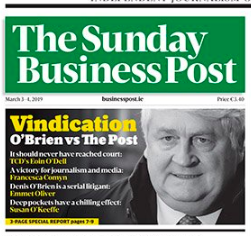Who will come first, Godot, or an Irish Minister for Justice bearing defamation reform? – updated
 Two years ago, the EU established the European Rule of Law Mechanism as a process of dialogue on rule of law issues between the EU institutions, the Member States, and civil society. 2020 saw the first of the annual reports. One of the issues highlighted in the report for Ireland related to the long-stalled process of defamation reform. In the intervening year, nothing has happened on the issue (understandably: there’s been a pandemic). However. it does feature in the Department of Justice Action Plan for this year, so the Commission, regarding the glass as half-full, has chosen to accept that at face value, and to welcome the prospect of reform before the end of the year:
Two years ago, the EU established the European Rule of Law Mechanism as a process of dialogue on rule of law issues between the EU institutions, the Member States, and civil society. 2020 saw the first of the annual reports. One of the issues highlighted in the report for Ireland related to the long-stalled process of defamation reform. In the intervening year, nothing has happened on the issue (understandably: there’s been a pandemic). However. it does feature in the Department of Justice Action Plan for this year, so the Commission, regarding the glass as half-full, has chosen to accept that at face value, and to welcome the prospect of reform before the end of the year:
…… Amendments to the Defamation Act, foreseen for adoption in the coming months, are expected to have a positive impact on the operation of journalists. … Following the announcement of the plans to revise the 2009 Defamation Act111, the Irish Government is finalising a statutory review. A new Scheme of Defamation could be presented by the end of 2021. As highlighted by stakeholders112, the current regime enables to impose a disproportionately high amount of damages for defamation, which can have a negative impact on journalistic freedom.

 The truth, as Oscar Wilde has Algernon Moncrieff remark to Jack Worthing in Act I of
The truth, as Oscar Wilde has Algernon Moncrieff remark to Jack Worthing in Act I of 



